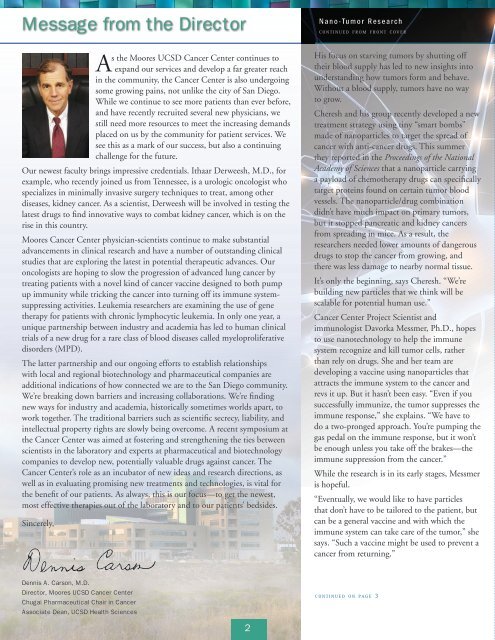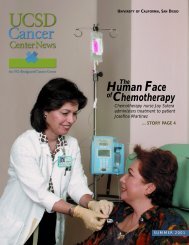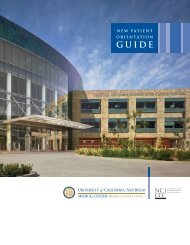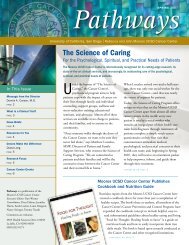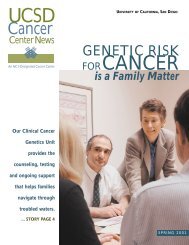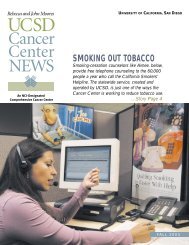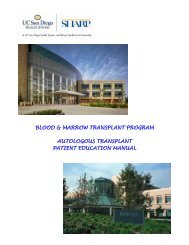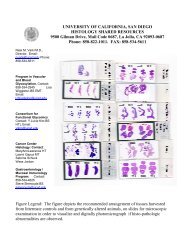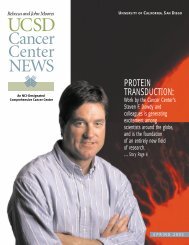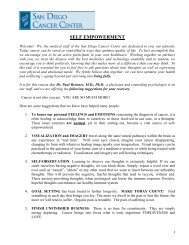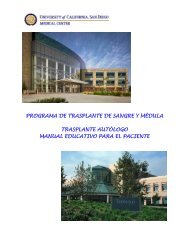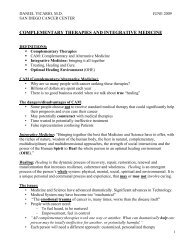lung Cancer Out loud - Moores Cancer Center - UC San Diego
lung Cancer Out loud - Moores Cancer Center - UC San Diego
lung Cancer Out loud - Moores Cancer Center - UC San Diego
You also want an ePaper? Increase the reach of your titles
YUMPU automatically turns print PDFs into web optimized ePapers that Google loves.
Message from the Director<br />
s the <strong>Moores</strong> <strong>UC</strong>SD <strong>Cancer</strong> <strong>Center</strong> continues to<br />
expand our services and develop a far greater reach<br />
in the community, the <strong>Cancer</strong> <strong>Center</strong> is also undergoing<br />
some growing pains, not unlike the city of <strong>San</strong> <strong>Diego</strong>.<br />
While we continue to see more patients than ever before,<br />
and have recently recruited several new physicians, we<br />
still need more resources to meet the increasing demands<br />
placed on us by the community for patient services. We<br />
see this as a mark of our success, but also a continuing<br />
challenge for the future.<br />
Our newest faculty brings impressive credentials. Ithaar Derweesh, M.D., for<br />
example, who recently joined us from Tennessee, is a urologic oncologist who<br />
specializes in minimally invasive surgery techniques to treat, among other<br />
diseases, kidney cancer. As a scientist, Derweesh will be involved in testing the<br />
latest drugs to find innovative ways to combat kidney cancer, which is on the<br />
rise in this country.<br />
<strong>Moores</strong> <strong>Cancer</strong> <strong>Center</strong> physician-scientists continue to make substantial<br />
advancements in clinical research and have a number of outstanding clinical<br />
studies that are exploring the latest in potential therapeutic advances. Our<br />
oncologists are hoping to slow the progression of advanced <strong>lung</strong> cancer by<br />
treating patients with a novel kind of cancer vaccine designed to both pump<br />
up immunity while tricking the cancer into turning off its immune systemsuppressing<br />
activities. Leukemia researchers are examining the use of gene<br />
therapy for patients with chronic lymphocytic leukemia. In only one year, a<br />
unique partnership between industry and academia has led to human clinical<br />
trials of a new drug for a rare class of blood diseases called myeloproliferative<br />
disorders (MPD).<br />
The latter partnership and our ongoing efforts to establish relationships<br />
with local and regional biotechnology and pharmaceutical companies are<br />
additional indications of how connected we are to the <strong>San</strong> <strong>Diego</strong> community.<br />
We’re breaking down barriers and increasing collaborations. We’re finding<br />
new ways for industry and academia, historically sometimes worlds apart, to<br />
work together. The traditional barriers such as scientific secrecy, liability, and<br />
intellectual property rights are slowly being overcome. A recent symposium at<br />
the <strong>Cancer</strong> <strong>Center</strong> was aimed at fostering and strengthening the ties between<br />
scientists in the laboratory and experts at pharmaceutical and biotechnology<br />
companies to develop new, potentially valuable drugs against cancer. The<br />
<strong>Cancer</strong> <strong>Center</strong>’s role as an incubator of new ideas and research directions, as<br />
well as in evaluating promising new treatments and technologies, is vital for<br />
the benefit of our patients. As always, this is our focus—to get the newest,<br />
most effective therapies out of the laboratory and to our patients’ bedsides.<br />
Sincerely,<br />
A<br />
Nano-Tumor Research<br />
c o n t i n u e d f r o m f r o n t c o v e r<br />
His focus on starving tumors by shutting off<br />
their blood supply has led to new insights into<br />
understanding how tumors form and behave.<br />
Without a blood supply, tumors have no way<br />
to grow.<br />
Cheresh and his group recently developed a new<br />
treatment strategy using tiny “smart bombs”<br />
made of nanoparticles to target the spread of<br />
cancer with anti-cancer drugs. This summer<br />
they reported in the Proceedings of the National<br />
Academy of Sciences that a nanoparticle carrying<br />
a payload of chemotherapy drugs can specifically<br />
target proteins found on certain tumor blood<br />
vessels. The nanoparticle/drug combination<br />
didn’t have much impact on primary tumors,<br />
but it stopped pancreatic and kidney cancers<br />
from spreading in mice. As a result, the<br />
researchers needed lower amounts of dangerous<br />
drugs to stop the cancer from growing, and<br />
there was less damage to nearby normal tissue.<br />
It’s only the beginning, says Cheresh. “We’re<br />
building new particles that we think will be<br />
scalable for potential human use.”<br />
<strong>Cancer</strong> <strong>Center</strong> Project Scientist and<br />
immunologist Davorka Messmer, Ph.D., hopes<br />
to use nanotechnology to help the immune<br />
system recognize and kill tumor cells, rather<br />
than rely on drugs. She and her team are<br />
developing a vaccine using nanoparticles that<br />
attracts the immune system to the cancer and<br />
revs it up. But it hasn’t been easy. “Even if you<br />
successfully immunize, the tumor suppresses the<br />
immune response,” she explains. “We have to<br />
do a two-pronged approach. You’re pumping the<br />
gas pedal on the immune response, but it won’t<br />
be enough unless you take off the brakes—the<br />
immune suppression from the cancer.”<br />
While the research is in its early stages, Messmer<br />
is hopeful.<br />
“Eventually, we would like to have particles<br />
that don’t have to be tailored to the patient, but<br />
can be a general vaccine and with which the<br />
immune system can take care of the tumor,” she<br />
says. “Such a vaccine might be used to prevent a<br />
cancer from returning.”<br />
Dennis A. Carson, M.D.<br />
Director, <strong>Moores</strong> <strong>UC</strong>SD <strong>Cancer</strong> <strong>Center</strong><br />
Chugai Pharmaceutical Chair in <strong>Cancer</strong><br />
Associate Dean, <strong>UC</strong>SD Health Sciences<br />
2<br />
c o n t i n u e d o n p a g e 3


